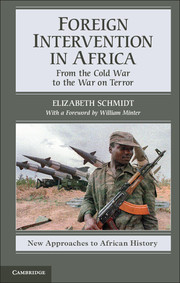Book contents
- Frontmatter
- Contents
- Illustrations
- Acknowledgments
- Foreword
- Abbreviations
- MAP 0.1. Africa, 1947. (Map by Philip Schwartzberg, Meridian Mapping, Minneapolis.)
- MAP 0.2. Africa, 2011. (Map by Philip Schwartzberg, Meridian Mapping, Minneapolis.)
- Introduction
- 1 Nationalism, Decolonization, and the Cold War, 1945–1991
- 2 Egypt and Algeria Radical Nationalism, Nonalignment, and External Intervention in North Africa, 1952–1973
- 3 The Congo Crisis, 1960–1965
- 4 War and Decolonization in Portugal's African Empire, 1961–1975
- 5 White-Minority Rule in Southern Africa, 1960–1990
- 6 Conflict in the Horn, 1952–1993
- 7 France's Private African Domain, 1947–1991
- 8 From the Cold War to the War on Terror, 1991–2010
- Conclusion
- Index
- References
Introduction
Published online by Cambridge University Press: 05 February 2013
- Frontmatter
- Contents
- Illustrations
- Acknowledgments
- Foreword
- Abbreviations
- MAP 0.1. Africa, 1947. (Map by Philip Schwartzberg, Meridian Mapping, Minneapolis.)
- MAP 0.2. Africa, 2011. (Map by Philip Schwartzberg, Meridian Mapping, Minneapolis.)
- Introduction
- 1 Nationalism, Decolonization, and the Cold War, 1945–1991
- 2 Egypt and Algeria Radical Nationalism, Nonalignment, and External Intervention in North Africa, 1952–1973
- 3 The Congo Crisis, 1960–1965
- 4 War and Decolonization in Portugal's African Empire, 1961–1975
- 5 White-Minority Rule in Southern Africa, 1960–1990
- 6 Conflict in the Horn, 1952–1993
- 7 France's Private African Domain, 1947–1991
- 8 From the Cold War to the War on Terror, 1991–2010
- Conclusion
- Index
- References
Summary
For many outsiders, the word Africa conjures up images of a continent in crisis, riddled with war and corruption, imploding from disease and starvation. Africans are regularly blamed for their plight. They are frequently viewed as being intolerant of ethnic and religious differences but accepting of corruption and dictatorship. They are often presumed to be unwilling or unable to govern themselves. This book challenges such popular myths. By examining the historical roots of contemporary problems, the book demonstrates that many of the predicaments that plague the continent today are not solely the result of African decisions but also the consequence of foreign intrusion into African affairs. Focusing on foreign political and military intervention in Africa during the periods of decolonization (1956–75) and the Cold War (1945–91), with reflections on the later periods of state collapse (1991–2001) and the “global war on terror” (2001–10), this book advances four central propositions.
First, as colonial systems faltered, imperial and Cold War powers vied to control the decolonization process. While imperial powers hoped to transfer the reins of government to neocolonial regimes that would continue to serve their political and economic interests, Cold War powers strove to shape a new international order that instead catered to their interests. Although independence struggles and their aftermath were dominated by local issues, Cold War intervention rendered the conflicts more lethal and the consequences longer lasting. Second, as the Soviet Union collapsed and the Cold War ended, African nations were abandoned by their Cold War allies. They were bequeathed a legacy of enormous debt; collapsed states; and, in many cases, deadly competition for the spoils. While indigenous prodemocracy movements challenged warlords and autocrats, foreign actors both helped and hindered their efforts. Neighboring states and regional, continental, and transcontinental organizations supported opposing sides in the war-making and peace-building processes. Third, the global war on terror, like its Cold War antecedent, increased foreign military presence on the African continent and generated new external support for repressive governments. Fourth, throughout the periods under consideration, foreign intervention tended to exacerbate rather than alleviate African conflicts and to harm rather than help indigenous populations. Even international humanitarian and peacekeeping efforts were marred by conflicting interests that sometimes hurt the people they were intended to assist.
- Type
- Chapter
- Information
- Foreign Intervention in AfricaFrom the Cold War to the War on Terror, pp. 1 - 17Publisher: Cambridge University PressPrint publication year: 2013



